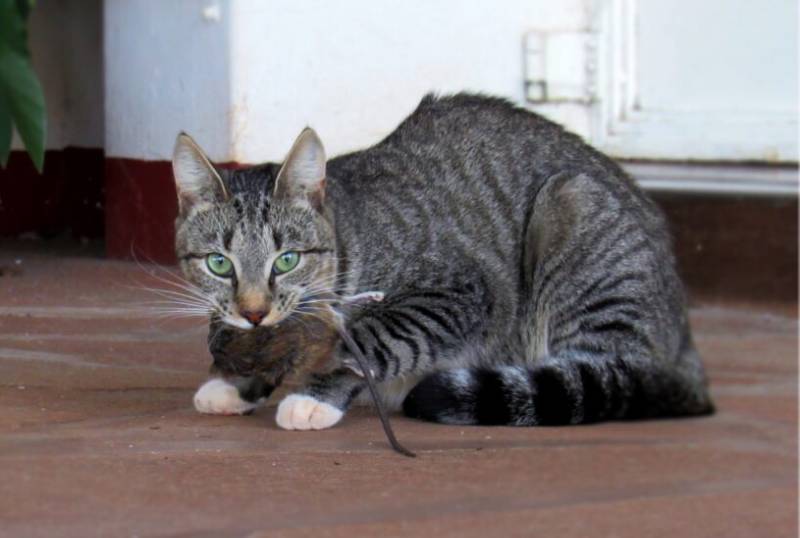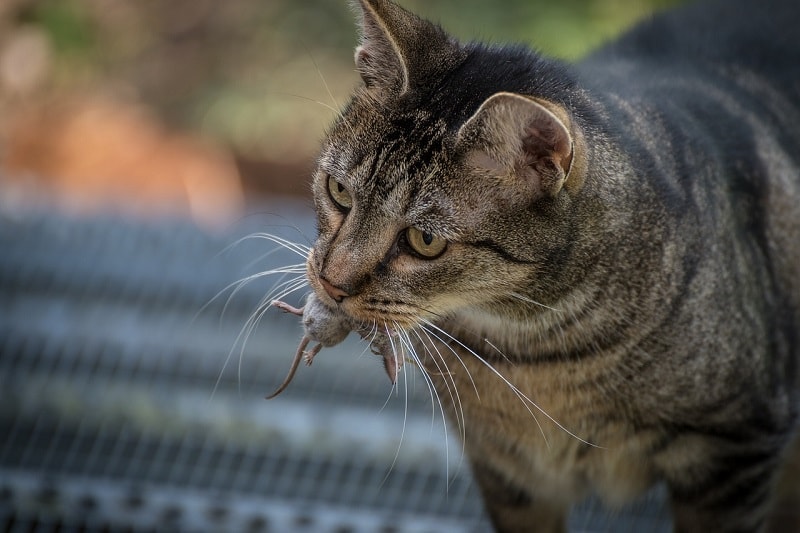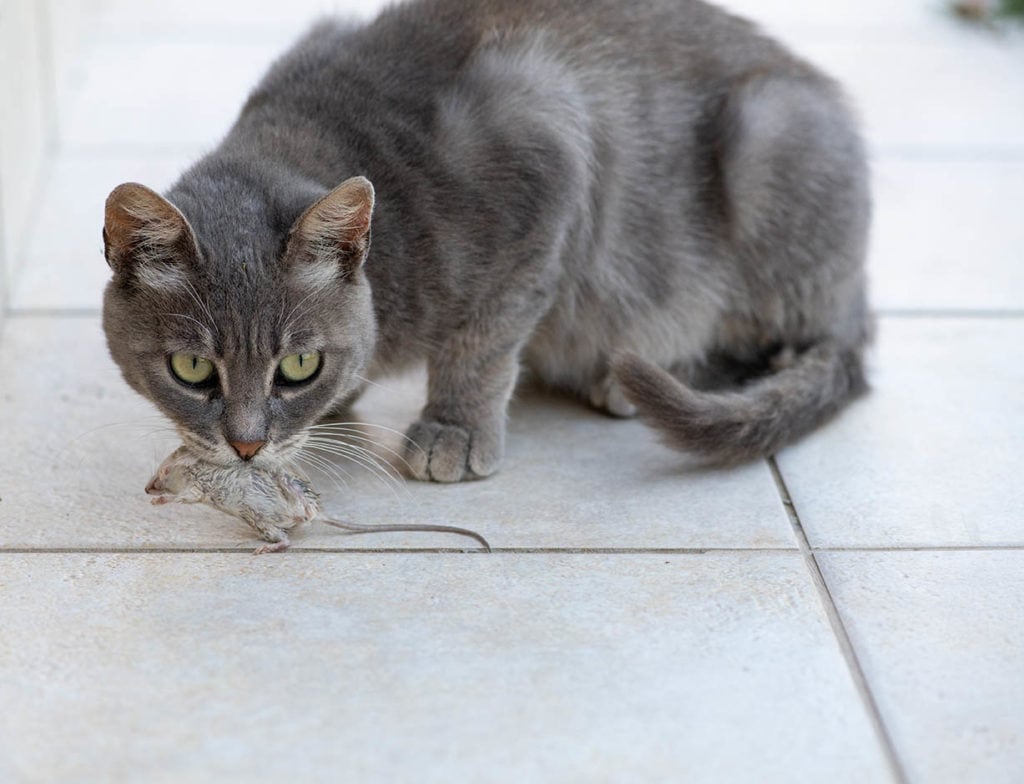Are Cats Good at Catching Rats? Feline Hunting Behavior Explained

Updated on

We all know that cats and rats don’t get along. So, if cats hate rats, that should solve a rodent problem quickly, right? They were the reason cats became domesticated in the first place, so it should be a flawless plan!
While studies have shown us that cats have played a big part in the extinction of some bird species, and we know that cats are good at catching prey, some research also reveals that cats aren’t as good at catching rats as we assume they would be. Read on to learn why!
Do Cats Instinctively Hunt Rats?
Cats are born with hunting instincts. We know this thanks to studies revealing the decline of rodent and bird populations because of feral and domesticated cats, with cats allegedly killing billions of small animals annually in the United States alone.1 However, their prey drive has declined due to centuries of domestication. Cats that hunt today typically do so for their own entertainment or to show their owner affection. Many cats don’t even eat their prey or kill it. Torturing and playing with their prey is typical behavior in indoor-outdoor cats that do not have the opportunity to catch live prey.
Cat mothers in the wild teach their offspring how to eat their food by bringing home their prey that is either injured or dead. This instinct also remains in domesticated cats, but because our pet cats are mostly spayed, most female cats don’t have offspring that can pass on their wisdom. With that being said, female cats are known to be better hunters than males, as well as older cats opposed to younger cats that are still homing in on their skills.
Most experts agree that breed, age, sex, temperament, and upbringing all play a role in determining whether a cat is suited for killing rodents.

Cats Actually Aren’t Very Good at Catching Rats
Fordham University conducted a study on rat pheromones in 2017.2 60 rats living in a Brooklyn, New York, recycling center were microchipped and monitored. The experiment caught the attention of the local feral cats, which was unintended, but the team decided to include them in their experiment to see how cats interacted with a known rat colony. They were curious to see if the cats would outright destroy the rat population or if it would be a long-standing game between the two species. The researchers watched and recorded the interaction for 79 days, which provided some illuminating results.
During the 79-day experiment, the rats were mostly ignored by the cats. The researchers recorded only 20 stalking attempts, three kill attempts, and only two successful kills by the cats! These results are pretty surprising and reveal that humans’ ideas of cats being effective rodent control are false. The researchers noticed that for every additional cat sighting, a rat was 1.19 times more likely to seek refuge, and this could be the reason that cats can help with rat populations.
But why were the cats uninterested in the rats? This contradicts everything humans believe about cats and their role in environmental damage. It’s most likely a matter of size. Rats are significantly bigger than mice, weighing approximately 650 grams, whereas a mouse can weigh up to 30 grams. Your poor cat would be in for quite a shock if it were looking for a mouse and came across a rat. The size of a rat is a clear message to your cat that it would be in for a fight. As for feral cats, they are more experienced and have many encounters with animals larger than them, so they understand the challenges of taking on a fight.
Will Rats Stay Away if There is a Cat Nearby?
Because cats are born with natural hunting instincts, many homeowners use them to catch rodents in their homes and property. However, this can be ineffective for many reasons and draw more pests into your home. A domesticated feline companion that is well-fed will have very little incentive to hunt and kill a rat.
However, they may deter the rats. Cats mark their territory by rubbing up against something and leaving their scent. Their scent alone is enough to make rats disperse and stay away. This also encourages rats to have hiding spots and nesting areas, which cats can’t get into. These spots are usually in the wall of your home, under cupboards or floorboards, or on the roof.
Even if your cat appears to be an avid hunter, it doesn’t mean your home will be rat-free. Rodents are known to reproduce incessantly. A female can have up to seven litters of 5–12 pups per year! As a result, your cat’s one or two successful captures will be ineffective in reducing the rat population.

How to Keep Your Cat Safe While Getting Rid of Rodents
Poisons, chemicals, and traps used in pest control can harm your cat, and pets cannot distinguish between poison and food. Rodent bait is especially dangerous to pets because it acts as an anticoagulant. It will thin the blood of the rat, causing internal bleeding, and it will affect your cat in the same way.
It’s important to prevent your cats from catching rats and keep them safe. Well, you try to sort out the rodent problem yourself.
- Add a bell to your cat’s collar. The jingle will warn the prey and give it a chance to escape.
- You can keep your cat indoors at night, limiting the opportunity to hunt.
- Use bait with a warfarin base.
- You can use chemicals like brodifacoum, difethialone, and bromadialone.
- Avoid leaving bait traps out in the open. Find a spot where rats enter your home, and your cat can’t reach.
- Check your bait traps frequently and remove the dead rat immediately.
- Store bait and poison in a locked cupboard.
Conclusion
While cats can easily hunt down birds and mice, they do it more for entertainment since they were domesticated. A well-fed cat is also not inclined to go out and hunt for its food. Rats are also relatively larger than mice and most songbirds. Some rats can even measure close to the size of your cat, and we guess that your cat will choose not to go to battle with something as big as itself.
See also:
- Is It Safe to Keep a Pet Rat and a Cat? Facts & Care Tips
- Will Rat Poison Kill My Cat? Vet Approved Safety Guide
Featured Image Credit: JumpStory












